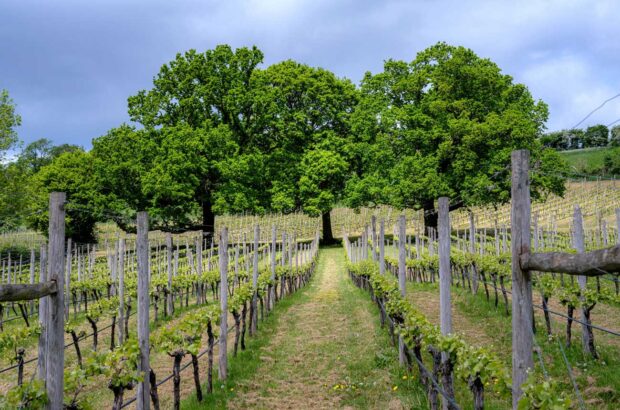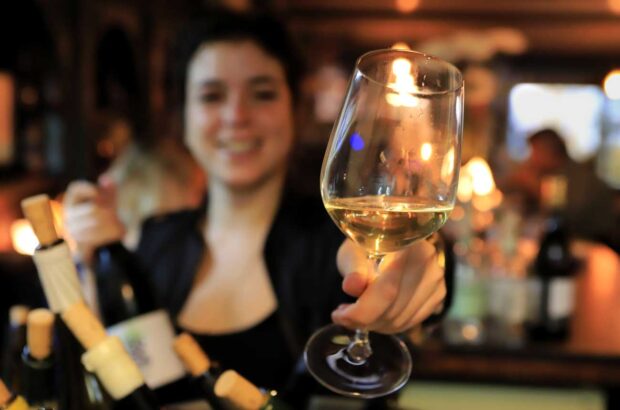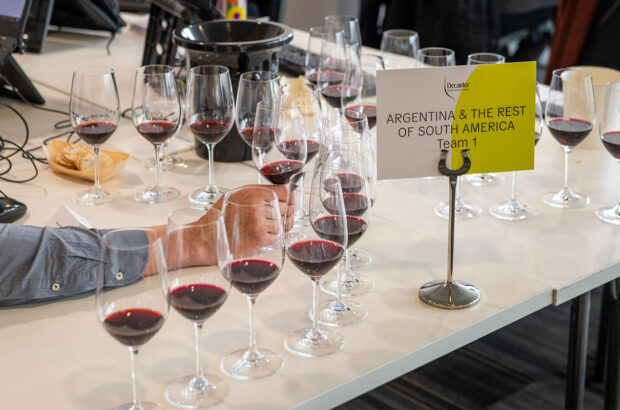This is a survey of five key Bordeaux wine professionals and consumers. Compiled by Edward Ragg, Dragon Phoenix Fine Wine Consulting, Beijing. longfengwines.com
Simon Zhou, Ruby Red Fine Wines, Shanghai
Do you think the Chinese are going to buy 09 futures as enthusiastically as Robert Parker suggests?
There is no established tradition of buying futures in China; although with wine consumption becoming an increasing habit, futures have also benefited from being promoted not only as a potential investment option but as a means of securing good wines at their earliest release prices. To suggest the Chinese will buy or not buy is too generic a way of looking at buyers and consumers here. There are, in fact, at least three types of buyers in mainland China: 1) wine drinkers (fairly regular consumers of Bordeaux), 2) investment buyers (those interested in long-term investment purchases who see wine as an optional investment channel or as a part of their overall investment portfolio) and 3) speculators (traders, essentially individuals who believe they can make quick money on futures). All of the above will have different motives for purchasing and will buy at different prices; as well, of course, as selecting different wines or different overall brands. I would say that speculators will be the biggest buyers of 09 Bordeaux. Wine drinkers, on the other hand, will not buy in mainland China as enthusiastically as most overseas media/trade seem to think or to be currently predicting.
Do you think they are going to buy wider than the traditional top wines this year, and if so, how much wider?
As discussed above, each category of purchasers will buy different products for different reasons. We are predicting that the 09 will be a heavily speculation-fuelled vintage. Therefore, only the top 15 or so brands, if that, will be considered as serious options for purchase.
Which wines are going to be most popular?
Without question, the 1st growths and especially Château-Lafite will be most popular. This prediction is based very much on the rise in brand awareness among mainland Chinese consumers, especially of the 1st Growths and of Lafite in particular. The prestige factor is a huge source of attraction, of course. 2009 1st growths, not least Lafite, will see a lot of speculation-fuelled buying. Outside those top wines, there are about 15 brands which, as suggested, will be heavily traded, as elsewhere in the world; while the rest will attract very little interest indeed.
Do you have any concrete evidence you can be quoted on?
We have a client who wanted to buy a thousand cases of Lafite. Again, that client was primarily interested in speculation based on likely price increases of such a prestigious wine in the future.
Do you think prices will stay reasonable as chateaux attempt to sell as widely as possible?
I think the top chateaux will release at high prices, but will still most likely be able to move their wines. However, the mid-tier chateaux need to be especially careful in terms of how they will price this year. Even the mid-tier properties may gain a small market in China, but they may, of course, simultaneously lose interest from en primeur buyers in their traditional markets.
How will new Chinese buyers react to high prices? Are they as sensitive as Americans and Europeans to price hikes or will they buy this year at any price?
If the prices are released too high, there will only be speculation-induced buying and perhaps then on a more modest scale. These purchasers will likely not be on-going clients for the chateaux. Such traders will easily change to other products when wine markets are tough. Wine drinkers in China, who are likely be longer-term customers – just as in any other country – will remain price sensitive and may avoid en primeur altogether.
Marcus Ford, The Wine Way (Pudao), Shanghai
Do you think the Chinese are going to buy 09 futures as enthusiastically as Robert Parker suggests?
There are fine wine lovers and connoisseurs all over China who are warming up to the idea of en primeur; but I do not believe that across the board they will have a really big impact. Those speculating on China’s future demand for classed Bordeaux in China will be the ones that may drive the campaign this year and they will predominantly come from outside China.
Do you think they are going to buy wider than the traditional top wines this year, and if so, how much wider?
Wine is a luxury commodity and as such those buyers who are in the market for luxury goods will buy the best of the best: i.e. 1st Growths and their equivalents.
There are some other chateaux that have established a sense of brand here; but I am not convinced that this will drive big demand for en primeur sales. I think the “wild card” in this equation is the extremely wealthy individuals and private companies who are buying for the first time. It’s very difficult to guess what these new buyers will buy and in what quantities. The scale of things here means that some of these buyers could be in the market for hundreds of cases of certain wines and that is very tough to predict.
Which wines are going to be most popular?
Lafite is head and shoulders above the rest in China. It is truly incredible how strong the image of Lafite is in China. Lafite is seen as the first of the 1st Growths here and their wines have performed so well with the critics over the last few years that it is hard to argue the case against this reputation. The whole stable of DBR wines has been extremely strong this year and I imagine that demand will stretch throughout the Lafite portfolio. Beyond the 1st Growths, other popular wines will include the 1st Growth’s second wines (especially Carruades de Lafite), the classics of the Right Bank and perhaps some Super-Seconds.
Do you have any concrete evidence you can be quoted on?
Go to any boardroom in China to talk about wine and the first question will inevitably be about Lafite. It is the ultimate lubricant to high-powered business and other important relationships in China.
Do you think prices will stay reasonable as chateaux attempt to sell as widely as possible?
Define reasonable?! Outside of the very top wines I believe the chateaux need to be conservative in their pricing. Anyone buying en primeur is doing so to get a deal, whether this enables access to wines with limited supply or simply the desire to acquire wines at the best possible prices (and, for preference, both).
How will new Chinese buyers react to high prices? Are they as sensitive as Americans and Europeans to price hikes or will they buy this year at any price?
Everyone is price-sensitive and anyone sophisticated enough to be in the market for en primeur will have a grasp of the economics of the system: “Buy early to get the best possible price” whether that be for future drinking or investment. Given the extent to which the wine press has been drawing parallels between the 2009 and 1982 vintages – the price for the latter has soared on the back of Chinese demand – it’s a very tough call. I would imagine that the chateaux will release wines slowly through several tranches to test the market. What is most interesting here is the fact that by far the majority of wines that are being bought in China are to drink and not for investment’s sake. I do not believe that many of the buyers in the mainland are buying with the intention of selling later; that in itself will lead to upward pressure on prices, as once they are sold to mainland buyers they will effectively disappear from the market. Speculators from outside China live in the hope that as 2009 becomes rarer the Chinese will want to buy in the future, as the latter have no established culture of cellaring vintages for the long-term and will drink what they can get their hands on now.
Michael Ma, wine lover and en primeur buyer
Do you think the Chinese are going to buy 09 futures as enthusiastically as Robert Parker suggests?
Interest in 09 futures has definitely picked up from 08. However, since 08 was largely the first year in which mainland Chinese started to buy Bordeaux futures, the 08-09 increase in interest can be attributed to organic growth plus the global hype for the 09 vintage. I think vintners who are betting on an explosion of demand from China in 09 are likely to be disappointed. Also, Mr. Parker is simply not as influential in China, especially in mainland China, as he is in the West. Only a handful of collectors and trade people subscribe to Parker’s The Wine Advocate or eRobertParker.com. China also lacks reputable, long-term wine traders with a proven track-record of handling en primeur; or even, for that matter, sustained fine wine sales. So, naturally, prospective clients will be cautious in locking down any investment over at least a 2-year period. For credibility and service, most people who are buying en primer are looking to purchase through predominantly British traders who have a shipping presence in the Hong Kong market.
Do you think they are going to buy wider than the traditional top wines this year, and if so, how much wider?
Only the classified growths would be in demand. To most Chinese consumers the 2nd-5th Growths are mostly unknown; so there will be little need to venture beyond the very top wines.
Which wines are going to be most popular?
Outside of the 1st Growths, then their 2nd wines as well as the 3rd-5th Growth stars of the vintage are likely to be most popular. Outside the 1st Growths, I’ll be personally looking at Léoville-Las-Cases – as well as Léoville-Barton and Léoville-Poyferré – along with Cos d’Estournel, Palmer, Pontet-Canet, Montrose, Lynch-Bages, Calon-Ségur, La Mission Haut Brion, among others.
Do you have any concrete evidence you can be quoted on?
I think the evidence for the mainland interest in Lafite especially is unquestionable. If you speak with wine importers here, this is pretty much what they report all of the time and it’s not purely hype to stimulate the market. If anything, it’s hard for importers to get consumers to inquire about anything else! Having said that, there may be some interest in other wines, as, for example, those mentioned above.
Do you think prices will stay reasonable as chateaux attempt to sell as widely as possible?
The prices are, in my view, already unreasonable. Almost all chateaux are releasing wines more expensively than 2005. Why?
How will new Chinese buyers react to high prices? Are they as sensitive as Americans and Europeans to price hikes or will they buy this year at any price?
There seems to be a widespread opinion that the Chinese will pay any prices to fetch top wines. However, if there’s one defining characteristic of the Chinese it is that they hate to be taken for fools. The Chinese are among the most savvy business people in the world. They will learn about the wine futures system very quickly and react just as a European or American would to unreasonable prices. Also, to most Chinese, vintage variation is still a theoretical not actual concept. So, people will buy the cheapest Lafite out there rather than splurging on a 1982, 2000 or 2005. It’s worth remembering, for example, that 2008 was a very special year to the Chinese.
Helen Qu, Les Millésimes Wine Club, Beijing
Do you think the Chinese are going to buy 09 futures as enthusiastically as Robert Parker suggests?
Maybe his suggestion will influence a few buyers, but most Chinese consumers do not consult Parker on a regular basis. In my opinion, most of the Chinese buyers will still focus on the 1er Cru Classé wines. They are looking primarily to drink these wines and they are not influenced by Parker as, in general, they do not know much about wine or about the international wine world.
Do you think they are going to buy wider than the traditional top wines this year, and if so, how much wider?
It’s certainly possible, particularly if pressure on the top wines is as fierce as would seem to be the case in other similarly very good vintages. Much will depend on prices and general availability. Those Chinese who are buying to drink may well look for relative bargains among other wines, if they are aware of them. If they are hoping to buy for speculation or for gift-giving among friends and colleagues, then it is unlikely they would look to buy that widely. It all depends on their motives for purchase. Certainly, if Chinese buyers can get their hands on reasonable quantities of important wines, even outside the 1st Growths, they will do so.
Which wines are going to be most popular?
1st Growths and 1er Cru Classé from St. Emilion as well as top Pomerol. Some 2nd wines, especially from 1st Growths and especially Carruades de Lafite, are likely to be very popular.
Do you have any concrete evidence you can be quoted on?
At our club it is Lafite that most people are asking for. If they are not happy with the 2009 release price, they will ask for other vintages; but some will buy purely to secure a sizeable quantity of Lafite.
Do you think prices will stay reasonable as chateaux attempt to sell as widely as possible?
It’s hard to say, but it looks like prices will not stay reasonable; although not everything has been released yet. Ideally, prices will be tagged to quality and not to perceptions of the market.
How will new Chinese buyers react to high prices? Are they as sensitive as Americans and Europeans to price hikes or will they buy this year at any price?
Yes, of course the Chinese are price-sensitive and just as likely as anyone else to react to high prices. Having said that, if they perceive 2009 to be as great a vintage as 2005, 2000 or 1982, then they may be willing to pay at high release prices, even for en primeur.
Grace Cai, Aussino Fines Wines, Guangzhou
Do you think the Chinese are going to buy 09 futures as enthusiastically as Robert Parker suggests?
Yes, I think so. Chinese people do tend to trust in the opinions of experts to a great extent and Robert Parker is so famous internationally that his prediction might make an impact. As many experts say, vintage 2009 is a very good one and the wines of this vintage have good potential in both price and quality.
Do you think they are going to buy wider than the traditional top wines this year, and if so, how much wider?
Yes. Many Chinese wine lovers are also keen to become wine investors. They may certainly buy wines that are not as famous as the top wines, such as Lafite, but have the potential for improvement both in the cellar and in terms of investment for the future.
Which wines are going to be most popular?
In terms of the Chinese market, there are some factors that tend to influence buyers over and beyond anything else: if the chateaux can speak of an illustrious history and convey their stories in terms likely to appeal to Chinese buyers, then this will make a huge difference. Advertisement is very important, as is pricing. For the people who know wines well, the wines that have a high quality-price ratio are obviously the best choice. In terms of gift-giving, top chateaux are always the best choice. For more regular consumers, lower-priced wines with good pedigree are likely to be attractive, but these are drinkers unlikely to be interested in en primeur in the first instance.
Do you have any concrete evidence you can be quoted on?
Aussino’s customers tend to ask about the most famous chateaux and their wines first: 1st Growths, the 1er Cru Classé wines of St. Emilion and the very best wines of Pomerol, in short the most advertised wines. Some of them have already purchased 2009 wines from us.
Do you think prices will stay reasonable as chateaux attempt to sell as widely as possible?
I don’t think the prices will stay reasonable mainly because of the demand, or at least perceived demand, emanating from Hong Kong and to some extent also from mainland China.
How will new Chinese buyers react to high prices? Are they as sensitive as Americans and Europeans to price hikes or will they buy this year at any price?
It depends on the motives behind their desire to purchase. Customers who are mainly buying for themselves will consider the prices very carefully; while those who have been commissioned to buy for others may be less concerned. I think Chinese buyers will be as sensitive as Europeans and Americans and they will think as carefully as anyone else before getting involved. But I think if they are really convinced that a sizeable profit can be made from buying en primeur, then they will buy the 2009 vintage.
Written by Edward Ragg, Dragon Phoenix Fine Wine Consulting






